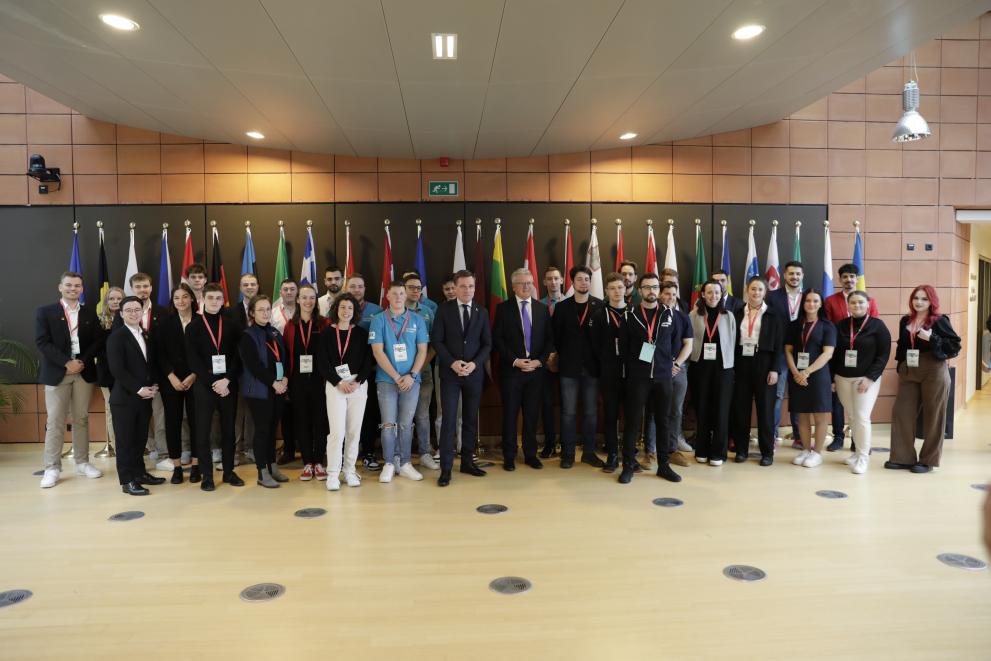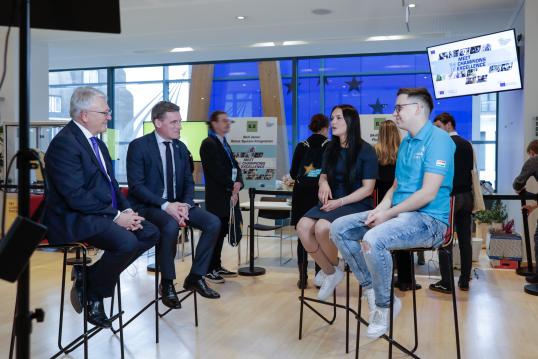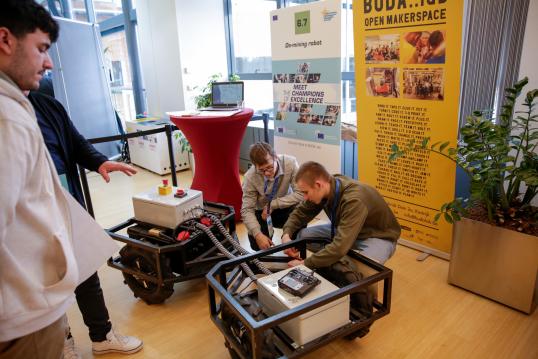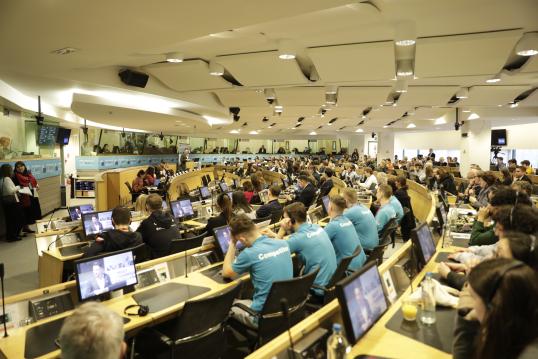
More than 500 participants, including some 400 young people, attended the flagship event of the European Economic and Social Committee (EESC) and the European Commission in person. More than 300 participants tuned in online from across the EU.
The day was all about highlighting vocational education and training as an effective learning and career path to quality jobs. For the young people attending, it was an occasion to meet with and watch demonstrations by 35 young champions from recent WorldSkills, EuroSkills and Abylimpics competitions.
Reflections from EESC President and European Commissioner for Jobs and Social Rights
Nicolas Schmit, European Commissioner for Jobs and Social Rights, reflected on how the day underscored the role of vocational pathways to high quality employment throughout the Union:
‘Vocational training offers so many opportunities in today’s labour market,’ he said. ‘I am convinced that VET has the potential to help us address the skills mismatches and labour shortages that are holding back Europe’s industries. Meeting the skills champions from across Europe was a great honour, and I hope it has inspired many young people to consider whether vocational training could be the right path for them.’
Echoing his remarks, Oliver Röpke, EESC President, was thrilled by the overwhelming interest in the event and by the example set by the champions represented:
‘Skills are a key ingredient for empowering young people to thrive in both their personal lives and their careers,’ he said. ‘With the digital and green transitions ongoing, we have the power, through skills, not only to adapt but also to sculpt the jobs of tomorrow. It is inspiring to see so many skills champions today, dedicated to pursuing their passions and advocating the value of vocational education and training.’
A vibrant exhibition floor
The day’s centrepiece was a marketplace featuring 20 interactive stands, including skills demonstrations in mechanical engineering, robot system integration, car painting, floristry, and more. Among those exhibiting was a Belgian collaboration between Buda::Lab, a public workshop, and PTI, a vocational training school. Volunteers and vocational students from the two organisations recently teamed up to build an affordable, life-preserving, demining robot, destined for Ukraine. Visitors to their stand had the chance to ‘meet’ the robot and talk to the students and engineers who built it.
This was just one demonstration of how, by choosing vocational education and training, young people can place themselves in the driving seat to make a real difference, as Buda::Lab Coordinator, Stan Dewaele explained:
‘We’re facing gigantic challenges in this world: switching to circularity and the resource shortage, digitalisation and its sustainability, energy supply, food supply... To respond to each of these challenges, we need people with expertise to invent and make products and systems in a different way!’
You can read a profile on this project and several other exhibitors here.
Champions have their say about the future of skills
Away from the buzz of the live demonstrations, the event gave the champions a platform to share their views about the role of skills in the job market - now and in the future.
In a packed panel discussion, Commissioner Schmit and EESC President Röpke sat down with the champions to speak about excellence in vocational education and training and its essential role in the labour market. Panellists emphasised the role of vocational pathways in fostering talent and highlighted their effectiveness in improving access to jobs with a powerful statistic: 80% of vocational graduates aged 20-34 secure employment! They called for better recognition of the value of vocational education and training and advocated for an integrated education system to enable upskilling and reskilling opportunities.
Takeaways from the workshops
The day invited all participants to engage in workshops on the following four themes:
Learning mobility: To celebrate the 35th anniversary of Erasmus+, participants talked about the advantages of mobility across educational sectors. To put the benefits into context, champions and apprentices shared their experiences of a variety of activities. For example, João Teixeira talked about his experience embarking on a Finnish citizenship programme, Michelle Hermann presented her internship experience in Valencia, and Josef-Paul Puchegger reflected on how his work placement on a Finnish construction site helped him improve his intercultural skills.
During the session the Commission shared its proposal to launch ‘Europe on the Move’ – a plan that would make mobility a requirement in all educational sectors (higher education, vocational education and training, school education including teacher mobility, adult education and youth exchanges) and create a truly European educational experience.
Fighting gender stereotypes: The second workshop was all about tackling the negative impact of gender stereotypes on individuals’ career choices. Participants heard from three young people who had to overcome gender stereotypes on their pathway into successful careers. They reflected on their specific experiences and suggested steps to tackle the negative impacts of gender stereotypes facing others. Suggestions covered several areas for intervention, such as gender-neutral communication, more flexible working policies and more inclusive outreach activities and recruitment approaches.
Skillset 4.0: The third workshop emphasised the transformative role of skills in the labour market, highlighting the shift towards medium- and highly skilled jobs because of automation. Discussions centred on the distinct kinds of skills required in today’s fast evolving employment market, including digital skills, meta skills (those needed to learn other skills) and human skills which are necessary for creativity and analytical thinking.
Digital skills for every age: The final workshop delved into the imperative of equipping individuals with digital and green skills as future members of the workforce. These twin transitions in the economy necessitate a shift towards green practices and automation, and this will have an impact on employment and skill requirements. There was a lively discussion around skills mismatches, particularly with an ageing population, and the need for proactive upskilling. Engagement with youth, fostering soft skills, and adapting to regional labour demands also emerged as crucial strategies for a sustainable future. Collaboration between employers and employees, along with a transformation mindset, were highlighted as key in navigating evolving professions and ensuring skill relevance.
Watch this space for video highlights from the Meet the Champions of Excellence event and check out our photo album on flickr!
Details
- Publication date
- 8 March 2024
- Author
- Directorate-General for Employment, Social Affairs and Inclusion



